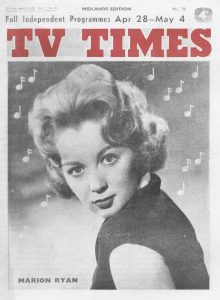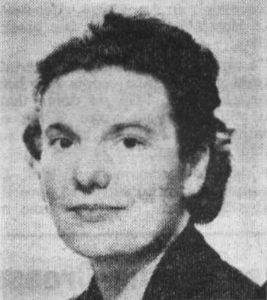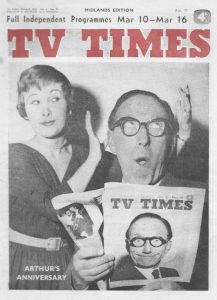From the TVTimes Midlands edition for 28 April to 4 May 1957
 Looking back on the early days of Independent Television, it is hard now to realise what unutterable chaos we grappled with, before and during that first autumn quarter.
Looking back on the early days of Independent Television, it is hard now to realise what unutterable chaos we grappled with, before and during that first autumn quarter.
The physical hazards alone were exceptional. There were many days in Television House when we could not hear ourselves speak for the noise of pneumatic drills and concrete mixers as the building was torn to pieces and put together again about our ears.
There was a week or more when we had no electricity and all work was done by paraffin lamps, and another dreadful spell when the building was without water.

There were also, of course, the larger problems of finding and training staff and performers, building a big organisation from scratch, and planning programmes.
Then it came. The moment on the evening of September 22, 1955, when the voice of the commentator said “Take it, Guildhall” and our first live remote programme was on the air. It was worth all the toil and sweat.
Life in Television House is no longer rugged, but the pioneering Haute still burns brightly, and for a small group of people of the first floor a date in May looms as large as did that first day of transmission.
At 2.45 p.m on Monday, May 13, the first Independent Television programme for schools goes on the air.
The School Broadcasting Section is hammering the programmes into shape. TV for schools must bridge the gap between two worlds: education and show business. The people who put the programmes on must have an understanding of both.
Such people are scarce, and in assembling our staff for this venture we have benefited from BBC experience, and put a production team of two on each series: a producer who knows more about teaching than television, and a director who knows more about television than teaching.
We have been fortunate in finding some people with qualifications on both sides: two of our producers, Alan Nicholson and John Frankau, have worked as floor managers, and one of our directors, Joan Kemp-Welch, is a fully-qualified teacher.
Apart from the need to combine different fields of experience, there is a great advantage in having a team of two on programmes such as these: I think any programme director would agree that the technicalities of direction at camera rehearsal take up so much of his attention that he is almost unconscious of what is said on the screen.
It is a valuable safeguard to have a producer present sufficiently detached from that hurly-burly to be able to assess the impact of the programme as a whole.
Moreover, we hope it will be possible for producers to leave the studio after the final run-through and dash to the nearest school that has a television set to view the results of their handiwork with children in a classroom. This can be invaluable in learning how to do better next time.
Thanks to the co-operation of members of our Educational Advisory Council, our production teams have been visiting schools and getting acquainted or re-acquainted — with their audience.
Alan Nicholson and Roger Jenkins, producer and director of the series The Ballad Story, spent an instructive day discussing poetry with different classes in a secondary modern boys school at Wimbledon.
Thora James has been talking to many groups of young people about to leave school or in their first jobs, and gathering material on the questions they would really like dealt with in her series On Leaving School.
The school programmes are to go out from Studio 9, in Television House — the studio from which This Week comes every Friday night. Eric Croall, our Co-ordinating Director, has been deep in plans with designers Anne Spavin and Michael Wield devising a flexible permanent set.
Scenery — in the sense of elaborate reconstructions of outside locations — forms no part of school TV plans, nor do we intend to build a classroom in the studios. The aim, rather, is to create an unobtrusive but effective background for the different programmes, and the imaginative use of lighting will play an important part in this.
As well as the stall behind the cameras, the performers in front of them also need the dual experience of television and classroom. Here, one is juggling constantly with different factors, balancing the desirability of having an experienced teacher with the necessity of having a trained interviewer, used to handling amateurs before the cameras, equating the extreme eminence of a V.I.P. with the fact that he has never been on television before and cannot spare much time for rehearsal.
We have been lucky in finding unexpected qualifications in Associated-Rediffusion’s staff. Redvers Kyle and Mitchell Raper, station announcers whose voices are well-known on Channel 9, both have teaching experience, and they will be seen in two of the schools series. Another series will be introduced by John Lord, the English teacher about whom you may have read in the TV Times of April 5.
John Lord’s was one of the hundreds of letters that came flooding in when this project was first announced. From these letters we are building a valuable index of people on whose experience we can draw in time to come.



